Paul Bocuse and Heston Blumenthal are not two chefs I think of putting together but that’s how it happen this week. In the past when I’ve cooked pears in red wine I have followed Paul Bocuse’s recipe from his book “My Classic Cuisine” published back in 1989. A book which now amongst the cookery book revolution of the last 10 years looks quite dated, it’s full of classic French restaurant recipes of the butter and vermouth and veal stock type but it also contains recipes which I wouldn’t change a single item like these pears in red wine.
Pears in vanilla is my winter norm, I haven’t cooked them in red wine for quite some time but when I came across a Heston’s recipe someone posted on a forum containing such exotic ingredients as liquorice I was intrigued…yes liquorice…is very exotic where I come from! Never tasted it other than in sweets. When I bought a packet from the health food shop I was really looking forward to chewing on some…I could tolerate it in my mouth for about 20 seconds before I had to spit it out…the anise flavour was too overwhelming…I haven’t been missing out then.
I read through Heston’s recipe and it read pretty straight forward enough, infuse the red wine first with the flavourings and poach pears, for those who know of him will know he doesn’t do simple. I had a bag full of pears from Bikerboy father’s tree and decided to make the recipes side by side, one recipe by the classic French chef and one recipe by the wacky British chef to see who came up trumps.
I must mention when I made these recipes I was recovering from a nasty cold and my nose was still a bit impaired, and when the recipes were ready for the taste test I made sure Bikerboy tried them without knowing who’s recipes it was. While cooking both pears I found Paul’s pears much more aromatic than Heston’s, even through my recovering nose it was a pleasure bending down to waft his wine. Heston’s recipe smelled less, what I was getting was sweetness rather than the aroma from his ingredients which really surprised me. His recipe has more aromatics with star anise, ginger, more cloves, lemon and orange peel but it has more sugar and in different forms too with the added liquorice and cassis. What was becoming striking to me through this experiment was having a recipe too sweet can impair the aromas to come through in your recipe, something that never occurred to me in the past.
Both pears and sauce were left at room temperature. I didn’t reduce the Heston’s sauce as he suggested you could because I didn’t want to sweeten it further. Bikerboy has sweeter loving tastebuds than me but even he thought Heston’s was too sweet for him making less enjoyable it’s the first thing that strikes you on tasting. He thought the second thing that came across strongly from Heston’s recipe was the taste of cloves, too many, overpowering. Because of my diminished sense of smell I was relying somewhat on what sensations I was getting on my tongue and Heston’s recipe left my tongue tingling a little but I couldn’t tell if it was from the ginger or liquorice maybe both.
Paul’s recipe has lemon juice and that acidity was welcomed in the aftertaste, giving both the liquid and pear a freshness, de-cloying your mouth and balancing it out from the initial sweetness of the sauce. Both of us would go back to the Paul’s recipe. I think Heston’s recipe could work for me if there was less sugar, less cloves and I couldn’t see what the liquorice added other than more sweetness.
The most welcomed lesson I learned from this test was something that was so striking with my semi-blocked nose; having a recipe too sweet can impair aromas to come through and therefore taste blander. This is sort of obvious when thinking about it, too salty, too hot, also have the same effect of impairing other flavours. I wasn’t expecting too much sugar to kill off aromas like it did, and since a huge part of our ability to taste food comes from aroma, it’s a good lesson to learn. It seems Heston’s exotic ingredient of liquorice brought nothing to the party other than sugar, this recipe sounded better on paper when it came to the execution it lacked.
Heston’s wine flavourings contains:
cassis
sugar
cinnamon stick
cloves
ginger
star anise
liquorice
orange peel
lemon peel
1 bottle red wine
8-10 pears
I’ve linked the recipe above published in the Times, the method is the same as Paul’s of bringing the flavouring ingredients to the boil with the wine, then poaching pears. I cut the ingredients in half that’s why you only see 3 cloves instead of the 6 in his recipe. You can see from the ingredients below it looks very colourful.
Paul’s flavourings:
1/2 vanilla pod
1 (10cm / 4 “) cinnamon stick
1 clove
75 gms (3 oz) sugar
juice of 1/2 orange
juice of 1/2 lemon
250 ml red wine
2 ripe pears
Bring all of the ingredients apart from the pears to the boil. Peel, half and core the pears, add them to the wine, bring the wine back to a simmer, turn off the heat and leave them to infuse for 6 hours. If the pears are hard you need to poach them gently on a simmer until they’re soft, then leave them to go cold in the wine. If you’re not adding the pears to the wine straight away it’s a good idea to brush them with lemon juice to prevent them discolouring.



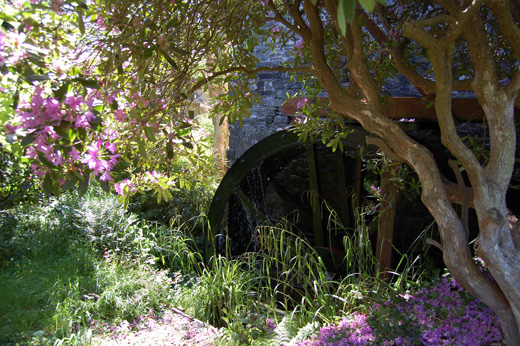
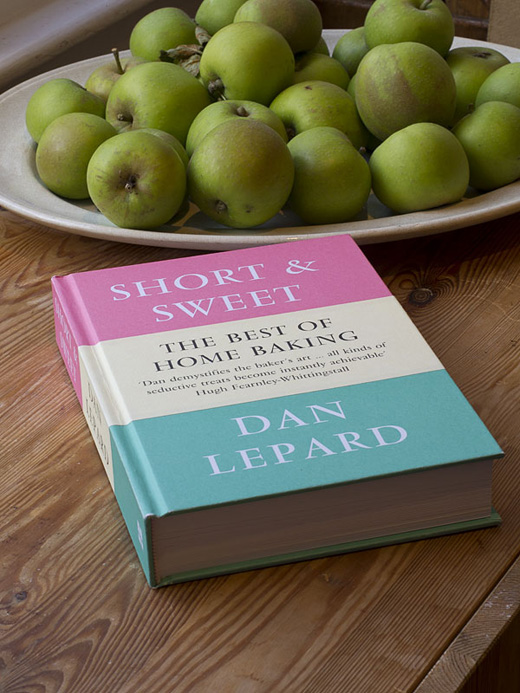


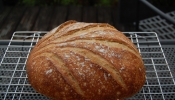
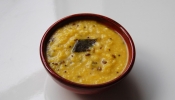


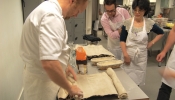


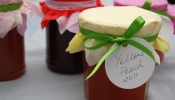
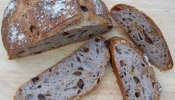

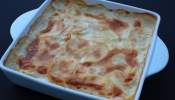



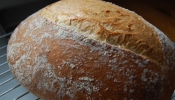





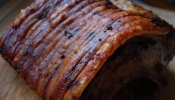
{ 10 comments… read them below or add one }
Love this kind of side-by-side comparison – best way to compare fairly as all other factors are equal…
I don’t deliberately follow M. Bocuse’s recipe, but the way I do pears in red wine is much closer to that. And always very successful! I am not a big fan of aniseed-y flavours, so I don’t think I would like the added licorice.
Interesting that adding more doesn’t always make it taste better. I poach my pears in red wine with lemon, orange peel, cinnamon, star anise and vanilla, but I don’t put a lot of sugar in.
Hi Kavey, Anna, Foodycat – I was really please to have done a side by side test and seeing the different results. I think if you choose a good quality red wine with some sugar it doesn’t need too many competing ingredients.
Definitely poaching pear weather approaching! Red wine poached pears looks good on the white plate. You’re right not often you see Heston’s name alongside the word ‘simple’!
Nice looking pears. I’ve never heard of Paul Bocuse but have come across the name Heston Blumenthal, interesting doing two recipes side by side. I’ve never made pears in red wine I should really as I have a pear tree!
Great test Azelia and very interesting results, makes for a good read, thank you! My experience of poaching pears is using an old Delia recipe from her Christmas book. She suggests, wine, cider or marsala as the poaching liquids. I like the marsala best! I am a liquorice fan – it’s my Danish roots – but I’ve never cooked with it. Did you see the lovely recipe on Dan Lepard’s site for a pear pastis? All on the ever lengthening ‘to cook’ list
Hi Joanna – I have come to like star anise and fennel seed flavour but the liquorice is something I struggle with. Pears in marsala are gorgeous. Tell me about that ‘cook list’…mine keeps getting longer, not shorter
This is fascinating! It hadn’t occurred to me that too much sugar would take away flavour – I’ve sometimes noticed that happen when there isn’t enough sugar. So it seems like the amount of sugar has to be juuuuuust right for maximum flavour. (I tend to prefer less sweet over more sweet….)
It isn’t really surprising to me that Bocuse’s recipe worked better than Blumenthal’s. Not that there’s anything wrong with Blumenthal’s recipes; it’s just that he seems to be constantly going for traditional flavours by re-inventing the wheel. (I do like the idea of adding fennel seed to the red wine for poaching the pears though.
(came across you via Susan at “Wild Yeast”)
Hi Elizabeth – yes sugar is like salt or lemon, can either carry flavours forward or kill them if too much is used.